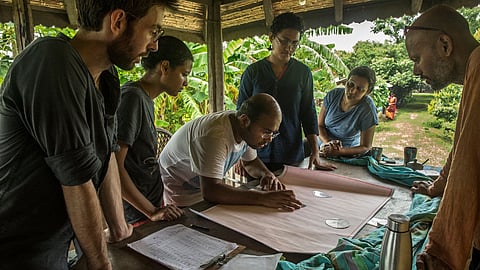
- Destinations
- Experiences
- Stay
- What's new
- Editor’s Picks
- Responsible Tourism
- CampaignsCampaigns
- Subscribe

People are increasingly embracing a more sustainable way of life by tweaking various lifestyle choices, for instance, by building homes in an earth-friendly way or by growing their own food. Several courses give you hands-on experience developing a small (even something on a balcony or window sill) or large food garden.
Purchasing locally farmed food from your farmer's market or local grocer is a terrific way to reduce your environmental impact, but growing your own food takes it to the next level. In conventional agriculture, vast amounts of water, chemicals, fuel, and other resources are expended on food production and transportation.
Smell Of The Earth is a beautiful farmstead in Birbhum (near Shantiniketan) owned by a couple who left their lives in the United States to settle in Tagore's homeland. They purchased land, built an earth-friendly house, and established a self-sufficient farmstead that is now the hub of teachings on permaculture, growing food, and living an eco-friendly lifestyle. The two-acre farm was set up from bare, denuded land and now meets all the family's food needs, including rice, wheat, lentils, potatoes, onions, vegetables, and fish.
They host several workshops and short courses throughout the year, and one is coming up in September.
The 18th Natural Farming Course at Smell of the Earth Farm will help you design and maintain ecological spaces from small urban areas to self-sufficient farms so you can step out of the chemical food cycles, provide wholesome organic food for your family, and create farm-based businesses.
The course is run by Aparajita and Debal, certified permaculture designers and consultants. They have worked together, without any permanent employees, to design and set up the farm.
"By designing your ecosystem according to permaculture and learning design patterns from nature, we can make even small spaces very productive. Our two-acre farm is a living example of that," says Aparajita.
"What did we do after we decided to farm and quit our jobs? It's not an easy question to answer, but let's just say we learnt something new daily," says Debal. "We had to because from day one at Smell of the Earth farm, we gave up the shore and swam straight to the centre of the stream. We chose not to have any other jobs, and although there have been times when it seemed like a rash decision, it meant we had to grit our teeth and keep at it. We bought land, travelled and volunteered and attended training to pick up skills, we started working hands-on immediately, and we constantly educated ourselves."
Aparajita and Debal are involved in all aspects of farming, including planting, harvesting, and post-harvesting.
They have also set up a small home-based business selling organic jams and pickles from their farm produce. They live permanently at the farm with their daughter, work as farmers, and connect with the surrounding community to spread the message of ecological lifestyles.
Their farm is not funded externally in any way. They are both deeply interested in ecological design and natural buildings. Debal has also designed the natural buildings on the farm. Their philosophy is to learn and teach through actual practical applications of theoretical knowledge.
Smell of the Earth completed nine years of existence in August 2023. "So here we are, nine years later," they posted on Facebook. "This life has given us joy and anguish, work and leisure, success and failure in equal measure. We have taught over 100 students in our Natural Farming Course and more through our short workshops, and we might have led some people to think about their food and how it is related to the future of our planet."
The couple are asking interested people to head out to Birbhum "if you want to live more sustainably in your current life, want to reduce your carbon footprint, want to create gardens big or small, want to see greener cities, or want to get off the employment treadmill to create small green businesses, or if you want to set up a farm."
Through the seven-day course, you will sample fresh organic food grown on the farm and stay in natural buildings.
What: The 18th Natural Farming Course at Smell of the Earth Farm
When: The 7-day course will be held from September 3 to 9, 2023.
Course details: Introduction to Ecological Farming; Introduction to how to design a farm using Permaculture principles; Hands-on introduction to natural farming of major crops, vegetables, fruits/ composting, pest control; Perennial tree planting and management; Water management; Map making.
Accommodation and food: Basic and shared rooms at the farm, clean western toilets. Healthy and tasty vegetarian meals from organic produce from the farm.
For more information, call or WhatsApp on 9163732096 or 9748831271 or email at smelloftheearthkol@gmail.com
